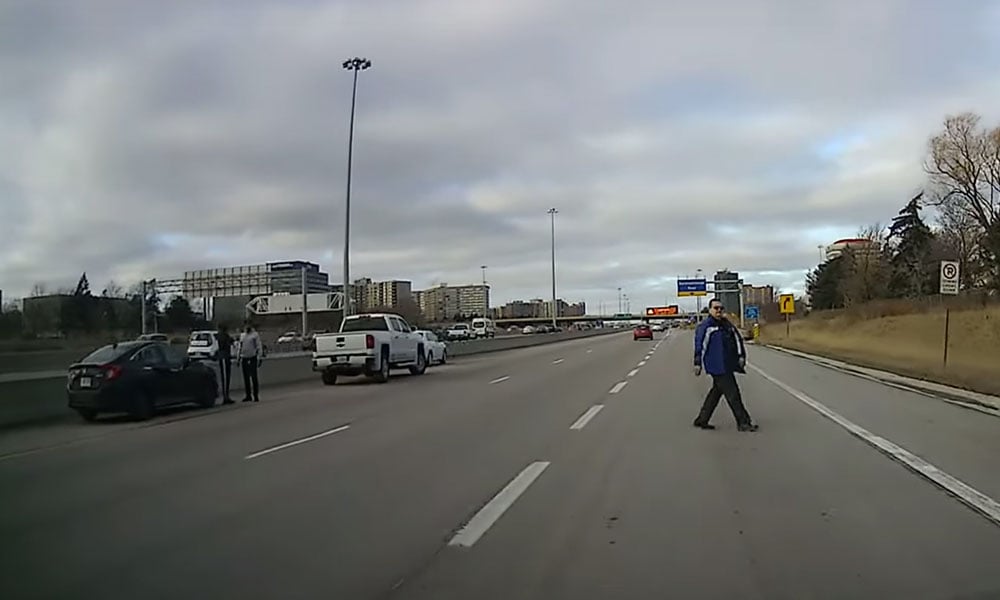
Video raised questions on social media

Social media commentators raised questions about a dashcam video which appeared to show a man walking across highway lanes, causing a car to brake and be rear-ended. The main question was: What does the law have to say about this?
The video, reportedly taken by Wayne Edward, depicts a man crossing Highway 427 from left to right just south of Burnhamthorpe Road. While the left side of the highway is only in frame for a moment, it appears the man could be walking from the site of a different fender bender to talk to another driver involved.
David Shellnutt, who founded The Biking Lawyer law firm, says that HTA Reg 627 prohibits pedestrians from using controlled-access highways, including the 427. An exception is made if “necessary because of an emergency.” Shellnutt says an emergency would be something like a burning car, for example.
Violating the Highway Traffic act is punishable by a traffic ticket, says Rose Leto, a partner at Neinstein LLP. The law also says that “No municipal by-law that purports to designate a pedestrian crossover on a highway on which the speed limit is in excess of 60 kilometres per hour is valid,” she notes.
While Shellnutt doesn’t practice criminal law and couldn’t speak to any consequences in that arena, he says that if the driver who took the video was injured, it could potentially be possible to sue on those grounds.
Vancouver lawyer Kyla Lee says it is illegal and “a classic example of jaywalking.”
“Pedestrians have the right of way when crossing at uncontrolled intersections or in a marked crosswalk,” she says. “At a pedestrian controlled intersection, they have the right of way when the light signals them to walk. At a timed (standard) intersection, they are also only permitted to walk when the walk signal is on. A pedestrian is never supposed to cross in the middle of a four-lane highway.”
A pedestrian can be held partly liable if a driver must brake unexpectedly, but in this case, problems might arise, said Lee. For one, it’s not clear if the driver was slowing down and moving over or trying to overtake slowed traffic. While not illegal, the latter might leave some fault with the driver, she said.
“First, once the pedestrian was clear, he did not immediately proceed. Instead, there appears to be some exchange as noted by the hand signals between the parties. That appears to be contemporaneous with the accident, so that may not be as big of an issue in the end,” she said of the driver.
“Additionally, the driver saw stopped traffic and rather than approach with caution, he changed lanes and attempted to pass. This is clear because as he is approaching the stopped cars, he is halfway in the #3 lane before moving back into the #4 lane at the last second.”
On the Twitter account of the Ontario Provincial Police, police Sergeant Kerry Schmidt warned that after a collision, “stay in your car, do not risk injury as a pedestrian, and get off the hwy as fast as you can.”